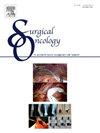The modified 5-factor frailty index predicts postoperative outcomes in patients with ovarian cancer undergoing hyperthermic intraperitoneal chemotherapy
IF 2.3
4区 医学
Q3 ONCOLOGY
引用次数: 0
Abstract
Objective
The objective of this research is to compare the ability of mFI5 to the mFI11 to predict frailty, postoperative complications, discharge location for patients with ovarian cancer undergoing hyperthermic intraperitoneal chemotherapy (HIPEC) at time of cytoreductive surgery.
Methods
This is a single-institution retrospective study in patients with advanced (Stage III, IV) or recurrent ovarian cancer treated with surgical cytoreduction with HIPEC. Logistic regression was used to evaluate frailty as well as factors associated with moderate to severe Accordion postoperative complications and discharge to home. Correlation was calculated between mFI5 and mFI11.
Results
Of 141 patients who received HIPEC between 2010 and 2020, 23 patients were classified as frail (mFI5 score ≥2), while 118 were not frail. Frail patients were significantly older with mean age 65.9 compared to non-frail patients who had mean age of 59.1 (p = 0.005), as well as a higher Charlston Comorbidity Index (p < 0.001), and more renal disease (p = 0.025), hypothyroidism (p = 0.005), and hyperlipidemia (p = 0.004). mFI5 and mFI11 scores for frailty were highly correlated (spearman rho 0.98, p < 0.001). Frail patients were more likely to be discharged to a skilled nursing facility (22.7 %) vs. 6.8 % of non-frail patients, or require home services (18.2 % vs 8.5 %, p = 0.025). On multivariable logistic regression, frail patients were more likely to experience moderate or higher Accordion postoperative complications (OR 3.08, p = 0.024).
Conclusions
The mFI5, a simpler tool than the mFI11, is also highly associated with postoperative complications and need for postoperative services in patients with ovarian cancer undergoing HIPEC at time of cytoreductive surgery.
改良的 5 因子虚弱指数可预测接受腹腔热化疗的卵巢癌患者的术后预后。
研究目的本研究的目的是比较 mFI5 和 mFI11 预测接受热腹腔化疗(HIPEC)的卵巢癌患者在细胞减灭术时的虚弱程度、术后并发症和出院地点的能力:这是一项单一机构的回顾性研究,研究对象为接受细胞减灭术和腹腔内热化疗(HIPEC)的晚期(III、IV期)或复发性卵巢癌患者。采用逻辑回归评估虚弱程度以及与中重度术后并发症和出院回家相关的因素。计算了 mFI5 和 mFI11 之间的相关性:结果:在2010年至2020年期间接受HIPEC治疗的141名患者中,23名患者被归类为体弱(mFI5评分≥2),118名患者并不体弱。与平均年龄为 59.1 岁的非体弱患者相比,体弱患者的年龄明显偏大,平均年龄为 65.9 岁(p = 0.005),查尔斯顿合并症指数(Charlston Comorbidity Index)也较高(p 结论:体弱患者的平均年龄为 65.9 岁,而非体弱患者的平均年龄为 59.1 岁(p = 0.005):与 mFI11 相比,mFI5 是一种更简单的工具,它也与接受 HIPEC 细胞切除手术的卵巢癌患者的术后并发症和术后服务需求高度相关。
本文章由计算机程序翻译,如有差异,请以英文原文为准。
求助全文
约1分钟内获得全文
求助全文
来源期刊

Surgical Oncology-Oxford
医学-外科
CiteScore
4.50
自引率
0.00%
发文量
169
审稿时长
38 days
期刊介绍:
Surgical Oncology is a peer reviewed journal publishing review articles that contribute to the advancement of knowledge in surgical oncology and related fields of interest. Articles represent a spectrum of current technology in oncology research as well as those concerning clinical trials, surgical technique, methods of investigation and patient evaluation. Surgical Oncology publishes comprehensive Reviews that examine individual topics in considerable detail, in addition to editorials and commentaries which focus on selected papers. The journal also publishes special issues which explore topics of interest to surgical oncologists in great detail - outlining recent advancements and providing readers with the most up to date information.
 求助内容:
求助内容: 应助结果提醒方式:
应助结果提醒方式:


